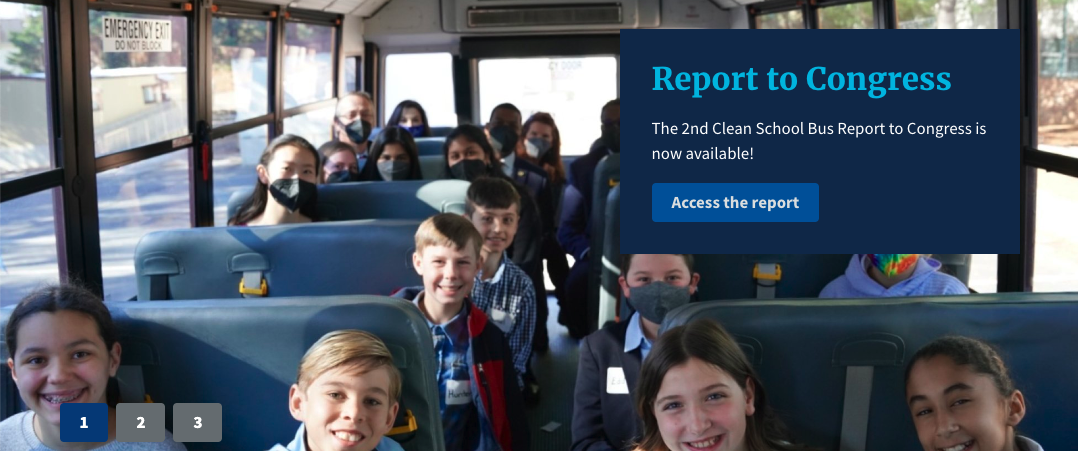EPA Administrator Regan Marks Delivery of Kansas’ First Electric School Buses, Announcing Electric Utility Pledge to Support Electric School Buses Nationwide –
EPA Highlights Progress to Invest in America Through Biden’s Bipartisan Infrastructure Law –
Staff Report –
WASHINGTON, D.C. – Just on the heels of President Joe Biden’s State of the Union Address, with a majority of 58 percent grading it an A, according to the Daily Blast, the Environmental Protection Agency rolled out the first all-electric school buses in Kansas on Wednesday, a historic investment from Biden’s Bipartisan Infrastructure Law.
EPA Chief Michael Regan visited Wabaunsee USD 329 School District in Alma, Kansas to celebrate the delivery, joined by students, school officials, and community leaders, talking about how initiatives like EPA’s Clean School Bus Program are delivering environmental and economic benefits for communities like Wabaunsee. During the visit, Regan announced a new pledge from electric utility partners to support efforts to electrify public school bus fleets nationwide.
“We’re moving faster than ever to accelerate the transition to electric and low-emission school buses, and new electric school buses in rural school districts like Wabaunsee USD 329 are a shining of example of what we can accomplish when we invest in America,” Regan said. “The Biden-Harris Administration is committed to building on this work and making investments accessible to more rural communities by partnering with electric utilities who have pledged to support school bus electrification.”
The Bipartisan Infrastructure Law provided EPA with $5 billion between FY22 and FY26 to replace diesel school buses with low- and zero-emission alternatives. In May 2022, EPA launched the first funding competition, initially making $500 million in rebates available to school districts nationwide. Given overwhelming demand, EPA nearly doubled the amount of funding for the 2022 rebates and awarded $965 million in rebates to 400 school districts for over 2,500 new clean school buses.
Wabaunsee USD 329 – a rural school district – is among the 400 school districts benefiting from these rebates. Their partner, Lion Electric, received $790,000 in rebates for two Type C electric school buses that will serve Wabaunsee USD 329. The new electric buses were delivered to the school district in December 2022 and are already transporting kids to and from school every day. The school district partnered with the City of Alma’s Municipal Utility to quickly deploy electric charging infrastructure to support the transition to electric charging.
“We are grateful for being chosen to receive this support for our students through the Clean School Bus program,” said Wabaunsee Schools Superintendent, Dr. Troy Pitsch. “This grant allows us to transport students cleaner and more safely to and from school. By the same token, we get the added benefit of cost-savings on transportation, redirecting funds normally spent on operations back into instruction.”
Regan also announced a new pledge to promote seamless collaboration between school districts and their electric utility providers, ensuring the successful deployment of electric school buses nationwide.
Edison Electric Institute (EEI), the association that represents all U.S. investor-owned electric companies, and the Beneficial Electrification League (BEL), a non-profit organization that works closely with rural electric cooperatives and public power utility providers on electrification initiatives, have joined with EPA to pledge their support for school bus electrification.
EEI members and BEL partners have pledged to proactively work with school districts too acilitate communication between electric providers and school districts, provide technical support and assistance, and work together to increase funding and deployment for electric school buses.
“EEI is proud to be working closely with the U.S. Environmental Protection Agency and the Beneficial Electrification League on the Clean School Bus Program,” said EEI President Tom Kuhn. “This program is a crucial step for reducing carbon emissions from the transportation sector. The new electric school buses will lower maintenance costs and help to improve local air quality while providing clean and reliable transportation for students. America’s electric companies are committed to helping their local school districts plan for their new electric school bus fleets.”
“Rural and small-town electric providers have a long tradition of assisting their communities with using electricity to improve quality of life for the local people they serve,” said Keith Dennis, President of the Beneficial Electrification League, pledged to help stakeholder utilities ensure that schools and the children they educate have a positive experience with electric school buses.
School districts that received rebate awards can now proceed with purchasing new buses and eligible infrastructure. If they have not done so already, selectees will need to submit Payment Request Forms with purchase orders demonstrating they have ordered new buses and eligible infrastructure. EPA is also partnering with the U.S. Department of Energy and Department of Transportation to provide school districts with robust technical assistance to ensure effective implementation.
Annual Report to Congress
The progress under this program is highlighted in the second Clean School Bus Report to Congress, which was also announced today during the visit. The report outlines activities and progress made in fulfilling responsibilities under EPA’s Clean School Bus Program to replace existing school buses with clean and zero-emission school buses. The Second Report to Congress summarizes the program’s activities and progress from January 2022 through December 2022 and includes detailed information on the 2022 Rebate funding initiative.
Highlights of the program’s first full year include:
* Extensive outreach and a widespread enthusiasm from schools across the country in the rebate program, especially among low-income, rural and Tribal stakeholders.
* Over 99% of the rebate selectees met the priority definition under the 2022 criteria, resulting in access to more funds for buses and EV infrastructure for schools in areas that need them most.
* A new online system to facilitate a straightforward and accessible rebate application process that proved to be highly effective.
* An interactive dashboard on epa.gov to provide up-to-date information about the awarded 2022 CSB Rebates.
Access the report here
The 2022 Clean School Bus Rebates prioritized low-income, rural, and Tribal communities. The vast majority of applicants met the priority definition under the 2022 Clean School Bus Rebates criteria, resulting in access to more funds for buses and electric vehicle infrastructure for schools in areas that need them the most. The rebates also delivered on President Biden’s Justice40 Initiative, which aims to deliver 40% of the overall benefits of certain federal investments to disadvantaged communities that are marginalized, underserved and overburdened by pollution.
EPA is also currently designing the next rounds of program funding to launch in the coming months, which will include an ambitious grant competition. Through future rounds of funding, EPA will make available another $1 billion for clean school buses in Fiscal Year 2023. EPA encourages school districts not selected in the first round of rebates – and those that did not apply this funding cycle – to participate in future rounds.
More information on the Clean School Bus program.
___
If you support truth in reporting with no paywall, and fearless writing with no popup ads or sponsored content, consider making a contribution today with GoFundMe or Patreon or PayPal.














